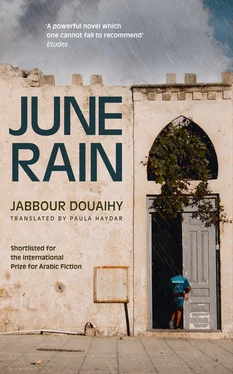His name was Samih al-Rami and his parents’ house with its adjoining bakery was in the Semaani family neighbourhood, five hundred metres from the first public senior school for girls, which the green line passed straight through. Neither party was ever able to stay there and set up barricades.
In the beginning he didn’t show any signs of anxiety, as if he depended upon some hidden power that protected him and made him immune to the general danger around him. The Semaani family members themselves, in particular the women, from whom nothing was kept hidden, used to forget he was an Al-Rami. When tensions flared up, the women cursed his family as they rolled out the dough and never expected any response from him. The only thing that bothered him was the voices that called to him from behind the barricades, where the armed men from his family were. Some of the voices, which he recognised, sometimes asked him to leave the Semaani neighbourhood and come to them.
‘They’ll kill you, Samih. They have no conscience and no religion!’
He asked Father Boulos to inform the men of his family over on the other side that he was doing fine, not to worry about him. And he asked him specifically to ask them to please stop calling to him so as not to draw their eyes to him. They stopped asking for him out loud, but there were still people in the nearby Rami family barricades who would sneak forward a few metres, hoping to catch a glimpse of Samih leaving his bakery or entering it and make sure that he was still alive and well.
Not much about Samih’s daily life changed, except for the Sunday stroll, that short strut down to the main road which was no longer the stage for bicyclists with their strange hats and multi-coloured shirts, and which had been abandoned by the young girls and the American and German cars. At the bakery, he stuck closer to the oven than before. He wasn’t just trying to lean away and avoid responding to the women’s talk and what they said about others anymore. Now he shoved his head as far inside the oven as possible so as not to hear the women’s talk at all — especially when news spread of someone from the Semaani family having been killed or even worse, if one of their unarmed young men fell victim to an ambush set for him outside the town. The women didn’t spare anyone from their tongues. Their chatter transformed into prayers for their demise. As a general rule, he didn’t say anything to them, even if one of them looked him straight in the eye and said, ‘Yesterday your cousins robbed Elias al-Rami’s house and then blew it up with dynamite… God damn all their houses!’
Samih would raise his eyes to the heavens in submission, declaring he had nothing to do with whatever was happening. Samih was an only child, his father had been an only child and his grandfather, too. There weren’t any direct relatives to speak of, no paternal cousins from his father’s brother from the Rami family, no sturdy family tree to be drawn up for them. They themselves knew nothing more than the fact that they were from the Rami family. And they didn’t belong to some junior branch. Some even said they hailed directly from the original Rami family.
Samih used to avoid hearing and avoid speaking even more. If he opened his mouth at all, it was to say something about the bread or the dough or to count the loaves which were the bakery’s entitlement — loaves he’d take out of each portion of his clients’ bread dough to sell — because Samih always counted out loud, as if he couldn’t keep track of the numbers unless he called them out. Or maybe he counted noisily in order to make it clear in front of witnesses that he was taking his fair share and not a single loaf more.
It’s possible Samih was convinced that his safety depended on watching his tongue. If he didn’t speak, he’d be safe. That was the idea of ‘the tepid tongue’ — the importance of words and the harmful nature of words that his father taught him. And perhaps his father’s other advice to him not to listen to the women was related to this idea of the neutrality of speech more than it had to do with being careful that the bread or the trays of kibbeh on Sundays didn’t burn inside the oven.
The war broke out and he began watching his movements. He went from the bakery to the house to the shop — he couldn’t do without the shop — reduced his movements to the nearest triangle and nowhere else. And he only went to the shop, which was a bit far and was exposed to people, at dusk, thus limiting the possibility of danger. The shopkeeper was a widow and sometimes he traded bread with her for eggs or goat’s milk yogurt, which he liked to drink cold. He counted the loaves in a loud voice and she counted the eggs as loud as she could, too. Sometimes he’d make a stop at the church.
Samih longed to go to church, but he wasn’t very consistent with his religious duties, especially because the bakery kept him from Sunday mass. He yearned to go to church, and would go inside for a split second, dip his fingers in the holy water, kneel alongside the wall beside the icon of the Virgin with a dark complexion and Indian features, which the donor who funded the building of the church and was an émigré to Mexico insisted be placed in a special spot inside the church. Samih quickly muttered his prayers and got up to leave. He hardly saw a single man during his day, only those who walked past. If he was afraid of anything, he was afraid of the women. And so he concluded that danger would come to him from the women.
But death came to him from the men.
The day one of their well-educated young men was killed, they came.
There were three of them who came along with the victim’s uncle.
They waited outside while the uncle came to the door.
He stood in the doorway, blocking the light from coming in. He had very broad shoulders.
His nephew had been in the Baccalaureate II class at the Frères School, preparing to take the government exams that had been postponed due to the fighting. He spent all his time studying.
‘They killed him with a book in his hands,’ his mother said, mourning him.
Maybe she meant to say figuratively that her son was a student unversed in the language of guns, or maybe he really had been reviewing his lessons out on the balcony where he thought bullets from the other side couldn’t possibly reach him. It seemed as if the Rami family had slipped into places where they could now make out back courtyards and houses whose inhabitants, believing they were out of their bullets’ reach, moved about freely. They would take advantage of them and hunt one of them down. Afterwards, the residents would avoid that exposed location or they’d build a makeshift wall to protect themselves from bullets coming from the opposing barricades.
The uncle was broad-shouldered and had rough features. He hadn’t sent his children to school. His brother had done that, and this had been his reward. He rushed to his brother’s house the moment he heard the news, leaned over his shoulder and said, ‘Didn’t I tell you not to educate your children?’
That was all he said.
As if his nephew’s education had caused his death.
In any case, the sun wouldn’t set on his murder. He swore on his mother’s soul. That’s what the uncle with the rough features said to himself. He grabbed one of his sons — one was plenty — and two fanatic relatives.
They knew about Samih’s presence in the neighbourhood. Everyone in the Semaani family knew of Samih’s presence, but they ignored him, saving him up for a rainy day.
They didn’t start with him. That would be too easy a prey, perhaps. They picked up their rifles, got in a car and hid around the bend. But soon they turned back.
It was more than likely that they didn’t get the chance they wanted. Maybe they waited and waited and no one passed by. They headed for the bakery.
Читать дальше












